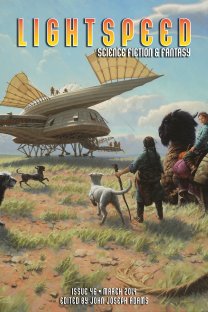Welcome back to the Short Fiction Spotlight, a space for conversation about recent and not-so-recent short stories. In our last installment, I talked about the winter issue of small magazine Ideomancer (12.4) and its three lyrical short stories. This time around, I’d like to talk about a few more pieces of short fiction, these from the most recent issue of Lightspeed Magazine: two original stories, “How to Get Back to the Forest” by Sofia Samatar and “A Different Fate” by Kat Howard,“ as well as one reprint, ”Turnover” by Jo Walton.
These three stories all share a structural similarity, though their thematic centers are quite different, and that’s their open-endedness paired with a particular sort of self-reflexivity. Each story is an exploration of an idea and/or occurrence without a concrete resolution; each is structured primarily around the protagonist thinking about or reflecting back on this thing, be it (in the case of the Walton story) an idea for the future or (in the other two) a haunting occurrence in the past.
It’s really interesting to see this same sort of structure managing three quite different kinds of stories—though it is, after all, a pretty common structure—in the same issue of the same magazine. All three of these pieces are also well-polished and attractively written, as I’d generally expect from their respective authors.
“How to Get Back to the Forest” by Sofia Samatar is a dystopic short, at first apparently about girls at camp—but in truth about the technologies of control that are being used to shape their development. The protagonist reflects back as an adult on her experience with her best friend at the camp, slowly revealing to us that the camps were more in the line of “re-education” than “summer camp,” until we finally realize that the “bug” that regulates their feelings is a real thing. This slow-reveal balances the familiar details of a summer camp against the disturbing otherness of the actual world of the narrative. That taking of the familiar and making it uncomfortable is what this story does best, and the ending, though open, is simultaneously quite hopeless.
I appreciated the resonance with the actual teen experience of camp as it meshes seamlessly with the dystopic reality of life in this future: things do not seem out of the ordinary, to the protagonist, because things are as they should be and are expected to be. It’s not until years, many years, later that she can come to grips with a suspicion that the system is monstrous.
“A Different Fate” by Kat Howard is a very short mythic piece, about a girl whose sister (a woman who weaves) becomes one of the fates; it’s lyrical, mostly works through implication, and is rather poetic in function. The structure here is also mostly reflective—reflecting on myths, on weaving as an activity, and finally on the two women who come to purchase the young women’s tapestry but end up taking her away to a different sort of fate instead. The close of the story is actually the only implied movement that occurs within the narrative: the sister leaves and leaves a note, that’s it. I thought this piece had a certain handsome appeal, but it’s also something I’ve seen plenty before—the triune fates, reinterpreted, the story of Penelope, reinterpreted, et cetera. The prose makes it worthwhile, but it doesn’t end up feeling particularly fresh—particularly with the open, reflexive structure that leaves most everything but the descriptions up to the reader in the end.
“Turnover” by Jo Walton is a reprint from a chapbook, and it deals with a sort of thought-experiment between a group of friends and associates who live on a generation ship: some would rather keep living on the ship with its unique arts and culture, some would rather make planet-fall, but it’s all way in the future. Over lunch, they decide on a potential solution: to have the ship orbit the planet, so each half can have somewhere to go. There’s not much, as you might have guessed, by way of action in this piece either. It’s mostly conversation among friends, debate, and the gentle details of life and art on the class-stratified generation ship.
Those details are actually what I found most engaging, here: the relationships between the friends based on their having been “collected” in a sense by the wealthy young man who has helped them achieve their dreams, the structure of the society that makes that possible, the arts like Balette (a low-gravity dance based on ballet), et cetera. It’s a soft, smooth, slow-moving piece where the solution to the problem is still just an idea—one of several discussed, though the best one—and the draw is actually the prose and the world rather than an arc.
The jury’s out for me, though, on whether or not grouping these individually decent stories so closely works well overall, whether or not these resonances end up perhaps echoing too strongly. Especially because, with these sorts of reflexive idea-stories, there’s not much in the way of motion: the sense of something happening, rather than something having already happened. There are, of course, other stories in the March issue—so there’s more balance than perhaps isolating these stories makes it appear—but I was still left with an odd sense of being ungrounded after reading these three in succession, a sense of waiting for something to change or occur in the narrative.
As it stands, in each the change or motion occurs through implication only, outside the frame of the story itself. Which is a fine strategy, don’t get me wrong, and one that works well enough in these pieces considered individually… but perhaps is less effective or evocative in repetition/juxtaposition. So, while these are certainly pieces worth reading, I might recommend spacing them out.
Lee Mandelo is a writer, critic, and editor whose primary fields of interest are speculative fiction and queer literature, especially when the two coincide. She can be found on Twitter or her website.










